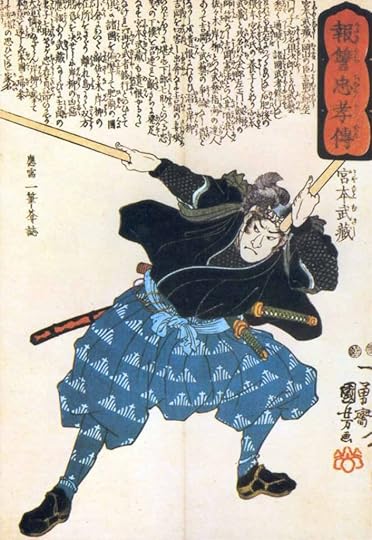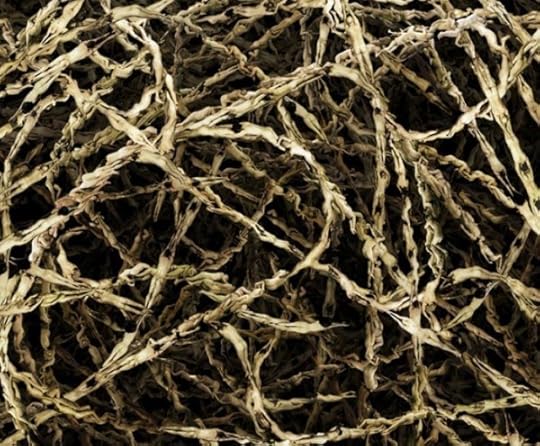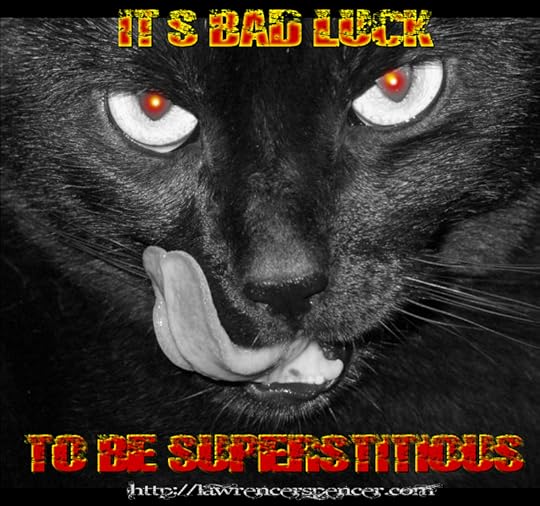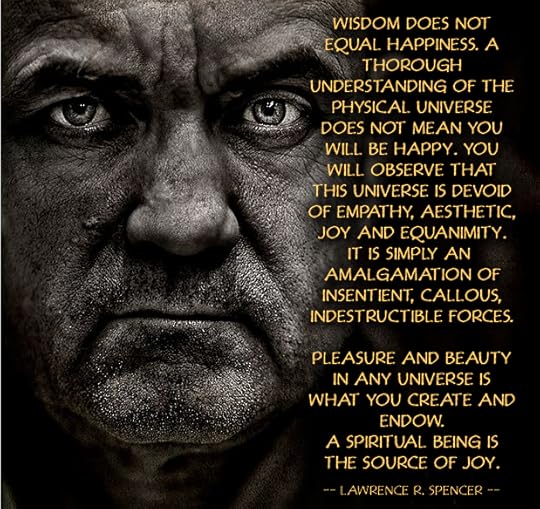Lawrence R. Spencer's Blog, page 411
March 21, 2017
DISEMBODIED
“The English word spirit (from Latin spiritus “breath“) has many differing meanings and connotations, most of them relating to a non-corporeal substance contrasted with the material body. The word spirit is often used metaphysically to refer to the consciousness or personality. The notions of a person’s spirit and soul often also overlap, as both contrast with body and both are understood as surviving the bodily death in religion and occultism, and “spirit” can also have the sense of “ghost“, i.e. a manifestation of the spirit of a deceased person.
Noun
1.
disembodied spirit – any incorporeal supernatural being that can become visible (or audible) to human beings
spirit
spiritual being, supernatural being – an incorporeal being believed to have powers to affect the course of human events
control – a spiritual agency that is assumed to assist the medium during a seance
evil spirit – a spirit tending to cause harm
banshee, banshie – (Irish folklore) a female spirit who wails to warn of impending death
djinn, djinni, djinny, genie, jinnee, jinni – (Islam) an invisible spirit mentioned in the Koran and believed by Muslims to inhabit the earth and influence mankind by appearing in the form of humans or animals
familiar spirit, familiar – a spirit (usually in animal form) that acts as an assistant to a witch or wizard
peri – (Persian folklore) a supernatural being descended from fallen angels and excluded from paradise until penance is done
apparition, fantasm, phantasm, phantasma, phantom, spectre, specter – a ghostly appearing figure; “we were unprepared for the apparition that confronted us”
presence – an invisible spiritual being felt to be nearby
kachina – a deified spirit of the Pueblo people
numen – a spirit believed to inhabit an object or preside over a place (especially in ancient Roman religion)
python – a soothsaying spirit or a person who is possessed by such a spirit
silvan, sylvan – a spirit that lives in or frequents the woods”
Definitions from TheFreeDictionary.com and Wikipedia.org
Originally posted 2013-11-27 20:46:19. Republished by Blog Post Promoter
March 20, 2017
SAND SCULPTURE FROM HELL
SEE MORE http://villafanestudios.com/
Originally posted 2011-11-05 10:37:52. Republished by Blog Post Promoter
March 19, 2017
CHAIN OF LIFE
http://www.angelomusco.com/home/ ( artist website )
The Italian photographer, Angelo Musco, evokes the primordial essence of biological survival through his prodigeously meticulous photo shoots of hundreds of naked bodies, linked in chains and configurations that suggest procreation of the species of Man. This is a fitting tribute and summary statement for the Spring Equinox, a time in the life cycle on Earth that invites and entices sexual interchange in nearly all species of life. Enjoy the creation! Enjoy the sensation! Enjoy the myriad forms of Life! However, do not forget that EVERY life form is animated by an eternal flame, the Spiritual Essence that is the true Source and Spark of Life. The Spirit, animating the form IS Life!!
Originally posted 2013-03-31 10:06:03. Republished by Blog Post Promoter
March 18, 2017
AIR TRAFFIC ON EARTH
March 17, 2017
WITCHES’ SABBATH
Friday is named for Frigga, the free-spirited goddess of love and fertility.
When Norse and Germanic tribes converted to Christianity, Frigga was banished in shame to a mountaintop and labeled a witch.
It was believed that every Friday, the spiteful goddess convened a meeting with eleven other witches, plus the devil — a gathering of thirteen — and plotted ill turns of fate for the coming week.
Friday was known as “Witches’ Sabbath. Thus, Friday, The 13th is an “unlucky” day …for Christians….
Originally posted 2011-05-13 00:32:01. Republished by Blog Post Promoter
March 16, 2017
WISDOM DOESN’T EQUAL HAPPINESS
“WISDOM DOES NOT EQUAL HAPPINESS. A THOROUGH UNDERSTANDING OF THE PHYSICAL UNIVERSE DOES NOT MEAN YOU WILL BE HAPPY. YOU WILL OBSERVE THAT THIS UNIVERSE IS DEVOID OF EMPATHY, AESTHETIC, JOY AND EQUANIMITY. IT IS SIMPLY AN AMALGAMATION OF INSENTIENT, CALLOUS, INDESTRUCTIBLE FORCES.
PLEASURE AND BEAUTY IN ANY UNIVERSE IS WHAT YOU CREATE AND ENDOW.
A SPIRITUAL BEING IS THE SOURCE OF JOY.”
— Lawrence R. Spencer —
Originally posted 2012-03-23 13:46:13. Republished by Blog Post Promoter
March 15, 2017
AFFLICTIONS
Laozi, a philosopher who wrote a small book called “The Way”, (Footnote) was an IS-BE of great wisdom, who overcame the effects of the “Old Empire” amnesia / hypnosis machinery and escaped from Earth. His understanding of the nature of an IS-BE must have been very good to accomplish this.
According to the common legend, his last lifetime as a human was lived in a small village in China. He contemplated the essence of his own life. Like Guatama Siddhartha, he confronted his own thoughts, and past lives. In so doing, he recovered some of his own memory, ability and immortality.
As an old man, he decided to leave the village and go to the forest to depart the body. The village gatekeeper stopped him and begged him to write down his personal philosophy before leaving. Here is a small piece of advice he gave about “the way” he rediscovered his own spirit:
“He who looks will not see it;
He who listens will not hear it;
He who gropes will not grasp it.
The formless nonentity, the motionless source of motion.
The infinite essence of the spirit is the source of life.
Spirit is self.
Walls form and support a room,
yet the space between them is most important.
A pot is formed of clay,
yet the space formed therein is most useful.
Action is caused by the force of nothing on something,
just as the nothing of spirit is the source of all form.
One suffers great afflictions because one has a body.
Without a body what afflictions could one suffer?
When one cares more for the body than for his own spirit,
One becomes the body and looses the way of the spirit.
The self, the spirit, creates illusion.
The delusion of Man is that reality is not an illusion.
One who creates illusions and makes them more real than reality, follows the path of the spirit and finds the way of heaven”.
______________
Excerpt from the book ALIEN INTERVIEW
“Laozi, a philosopher who wrote a small book called “The Way”…”
“According to tradition, it was written around 6th century BC by the Taoist sage Laozi (or Lao Tzu, “Old Master”), a record-keeper at the Zhou Dynasty court, by whose name the text is known in China. Tao Te Ching is a Chinese classic text. Its name comes from the opening words of its two sections: 道 dào “way,” and 德 dé “virtue“.
 This ancient book is also central in Chinese religion, not only for Taoism (Dàojiāo
道教
) but Chinese Buddhism, which when first introduced into China was largely interpreted through the use of Taoist words and concepts. Many Chinese artists, including poets, painters, calligraphers, and even gardeners have used the Tao Te Ching as a source of inspiration. Its influence has also spread widely outside East Asia, aided by hundreds of translations into Western languages.”
This ancient book is also central in Chinese religion, not only for Taoism (Dàojiāo
道教
) but Chinese Buddhism, which when first introduced into China was largely interpreted through the use of Taoist words and concepts. Many Chinese artists, including poets, painters, calligraphers, and even gardeners have used the Tao Te Ching as a source of inspiration. Its influence has also spread widely outside East Asia, aided by hundreds of translations into Western languages.”
Tao is nameless. (Tao) goes beyond distinctions, and transcends language.
Laozi describes a state of existence before time or space:
“The Way that can be told of is not an unvarying way;
The names that can be named are not unvarying names.
It was from the Nameless that heaven and Earth sprang;
The named is but the mother that rears the ten thousand creatures.
Each after its kind.”
“The Spirit never dies.
It is the Mysterious Female.
The doorway of the Mysterious Female
Is the base from which Heaven and Earth sprang.
It is there within us, all the while;
Draw upon it as you will.
It never runs dry.
We put spokes together and call it a wheel;
But it is on the space where there is nothing that the value of the wheel depends.
We turn clay to make a vessel;
But it is on the space where there is nothing that the value of the vessel depends.
We pierce doors and windows to make a house;
And it is on these spaces where there is nothing that the value of the house depends.
Therefore just as we take advantage of what is,
we should recognize the value of what is not.
Knowing others is wisdom;
Knowing the self is enlightenment.
Mastering others requires force;
Mastering the self requires strength;
He who knows he has enough is rich.
Perseverance is a sign of will power.
He who stays where he is, endures.
To die but not to perish is to be eternally present.”
Many believe the Tao Te Ching contains universal truths that have been independently recognized in other philosophies, both religious and secular.”
— Reference: Wikipedia.org
Originally posted 2015-04-05 21:47:35. Republished by Blog Post Promoter
March 14, 2017
AESTHETIC SOLITARY
 Henry James, OM (15 April 1843 – 28 February 1916) was an American-born British writer. He is regarded as one of the key figures of 19th-century literary realism.
Henry James, OM (15 April 1843 – 28 February 1916) was an American-born British writer. He is regarded as one of the key figures of 19th-century literary realism.
His secretary remarked in her monograph Henry James at Work: ‘When he walked out of the refuge of his study and into the world and looked around him, he saw a place of torment, where creatures of prey perpetually thrust their claws into the quivering flesh of doomed, defenseless children of light … His novels are a repeated exposure of this wickedness, a reiterated and passionate plea for the fullest freedom of development, unimperiled by reckless and barbarous stupidity.”
March 13, 2017
DOKKODO (THE PATH OF ALONENESS)
 The “Dokkōdō” (Japanese: 独行道?) (“The Path of Aloneness”, “The Way of Walking Alone“), is a short work written by Miyamoto Musashi (宮本 武蔵) a week before he died in 1645.
The “Dokkōdō” (Japanese: 独行道?) (“The Path of Aloneness”, “The Way of Walking Alone“), is a short work written by Miyamoto Musashi (宮本 武蔵) a week before he died in 1645.
Precepts:
Accept everything just the way it is.
Do not seek pleasure for its own sake.
Do not give preference to anything among all things.
Think lightly of yourself and deeply of the world.
Be detached from desire your whole life.
Do not regret what you have done.
Never be jealous.
Never let yourself be saddened by a separation.
Resentment and complaint are appropriate neither for oneself nor others.
Do not let yourself be guided by the feeling of lust or love.
Do not seek elegance and beauty in all things.
Be indifferent to where you live.
Do not pursue the taste of good food.
Do not hold on to possessions you no longer need.
Do not act following customary beliefs.
Do not collect weapons or practice with weapons beyond what is useful.
Do not fear death.
Do not seek to possess either goods or fiefs for your old age.
Respect Buddha and the gods without counting on their help.
You may abandon your own body but you must preserve your honor.
Never stray from the Way.
March 12, 2017
YOUR VOICE ALONE
 Samuel Barclay Beckett (13 April 1906 – 22 December 1989) was an Irish avant-garde novelist, playwright, theatre director, and poet, who lived in Paris for most of his adult life and wrote in both English and French. He is widely regarded as among the most influential writers of the 20th century.
Samuel Barclay Beckett (13 April 1906 – 22 December 1989) was an Irish avant-garde novelist, playwright, theatre director, and poet, who lived in Paris for most of his adult life and wrote in both English and French. He is widely regarded as among the most influential writers of the 20th century.
Beckett’s work offers a bleak, tragicomic outlook on human existence, often coupled with black comedy and gallows humour, and became increasingly minimalist in his later career. He is considered one of the last modernist writers, and one of the key figures in what Martin Esslin called the “Theatre of the Absurd”. Beckett was awarded the 1969 Nobel Prize in Literature.
Originally posted 2016-03-06 03:16:15. Republished by Blog Post Promoter









